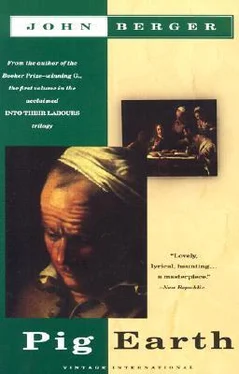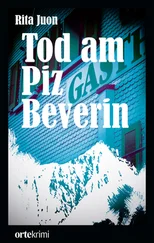Are you going away to work in Paris this autumn? she asked.
Yes.
I’ll catch a marmot for you to take with you.
How?
That’s my secret.
You dig them up when they’re asleep?
Will you go up the Eiffel Tower? she asked, ignoring my remark.
The others will be waiting, I said. Thank you for the coffee.
They’re singing, she told me. Can’t you hear?
No.
She opened the door. They were singing “Mon père a cinq cent moutons.”
I’ll fetch you some butter, she said.
We don’t need any.
You have so much at home that you can refuse butter?
She left me and went through the door into the stable. By now the moon was up, and a little of its light came through the dusty window, no larger than an open book, and down the wooden chimney. There was a pool of moonlight around the dead ashes.
When the Cocadrille came back, I gasped. She had taken off her blouse and chemise. I could see her breasts, each scarcely larger than the bowl of a wooden spoon. She came and stood right in front of me, and I saw that the dark nipples of her breasts were dripping with milk.
It was not until next morning that I reasoned that she must have poured cow’s milk over her breasts when she went into the stable. At the time I thought of nothing beyond the thin warm arms she put round me.
We went to lie on the bed, a wooden shelf at the far end of the room. As I caressed her, lying on the bed, I had the impression that she grew larger. She grew as large as the earth upon which I had to throw myself.
How you stir me! she cried, you stir my milk!
The only other time I had been to bed with a woman was in a brothel in the garrison town of L …, and there the lights were pink and the prostitute was as white and plump as a pig. Was that, I asked myself later, why the Cocadrille had asked for the one who had been in the army?
At two in the morning she dressed and reminded me not to forget the butter. As I left, she reached up and pulled the hair at the back of my head, digging her nails into my scalp. I knew the path down by heart.
Suddenly a cloud obscured the moon so that I could see nothing. A noise in the undergrowth made me stop. On every side the low bushes were being trampled. For the third or fourth time that night my heart raced wildly, yet this time, unlike the others, my whole body felt icy. I took to my heels. I ran for ten minutes without stopping, as if I were running from damnation itself.
Later when I reasoned that the Cocadrille must have poured cow’s milk over her breasts, I also reasoned that on my way home I had disturbed some sleeping goats.
What was it that made me go back the following evening? Why did I deliberately go up alone, avoiding my companions? She gave no sign of surprise at my arrival.
So you’ve finished the butter! she said.
Can you give me some more?
Yes, Jean. She pronounced my name solemnly in her deep voice. It was as if she had invented the name herself. Nobody else had ever said my name like that. It disturbed me because it separated me from all other men called Jean or Théophile or François.
She made some coffee. I asked her what she had done and she recounted her day to me. She asked me nothing about myself, but sometimes she looked at me, as if to make sure that I corresponded with the name she had pronounced. We sat across the table, facing each other in the darkness. It was now as dark outside as in. There would be lights in the windows of the other chalets. I knew why she had not lit the lamp: any visitor would conclude that she was already asleep. When a cow moved her head in the stable the note of the bell filled the room, and it was like a reminder of what we were about to do. By now neither of us spoke. I could even hear the breath of the cows. It crossed my mind to leave then and there. Yet it was already too late. Everything outside was already distant, like a coastline seen from the stern of a ship.
She had placed a candle by the bed. Without a word, she lit it. The blanket was white and smelt of sunlight. In the morning, after the cows had grazed, she must have washed the blood from the blanket. I lay there and watched her undress. She threw her clothes onto the table and strode onto the bed.
Stir me! She said this standing over me.
I began to shout at her. I called her obscene names. I referred to parts of her with the words we used for animal parts. All she did was to smile and then, squatting, she sat on me as if I were a horse. I tried to make her fall off and she held onto my shoulders and laughed. Her laughing made me laugh. My shouting stopped. I made a noise like a horse neighing. I neighed and she gripped the hair above my ears as if it were a mane. Later I asked myself how she made me do such things.
We played and made love on the wooden stage of the bed as though we possessed the strength of the whole village. Perhaps that is an old man’s boast. I could literally pick her up with one arm, yet every time I tried to put my feet on the floor, she succeeded in pulling me back. It was difficult to believe she was the same woman whom I had passed so often, during the first years of the war, working alone in a field, cursing and already bent with a kind of weariness. I made her laugh by measuring her limb by limb, part by part, against myself. Today I have made a mark on the doorpost of the kitchen to help me recall her real height, before, like all of us, she shrank in old age. One metre, twenty-five centimetres is what I’ve marked. None of the rest is measurable.
At last we were exhausted and I got up to breathe a little in the fresh air. On the slope behind the Cabrol chalet there is a fold in the earth like a furrow, down which a trickle of water runs. The water makes the flowers grow profusely there, and on both sides of the fold, there are millions of ranunculi, the small, white five-petalled flowers which cows will not eat. I sat down amongst these flowers and the Cocadrille, wearing a man’s hat, came out to join me. The other chalets were silent. The crickets had long since stopped. Below were the roofs of the village, no larger than dice.
She lay back among the grasses and ranunculi and looked up at the sky where the stars were the same shape as the flowers, and lying on her back she began to talk. She spoke about herself, about her brother Emile, about the land she would one day inherit, about the cows, about what she thought of the curé, about how she would never marry. At first I listened to what she was saying without much attention. Then gradually it occurred to me that she was saying all this because it might turn out to be otherwise. I became convinced that she was plotting one thing whilst talking about its opposite. It wasn’t true that she would never marry. She was plotting to make me her husband. She believed she was now pregnant and so I would be forced to marry her.
Lucie! I interrupted her as we sat there in the firmament of flowers. I do not know why I used her real name.
Yes?
I’m not going to come up again.
I didn’t expect you to, Jean.
Her reply confirmed my worst suspicions. It meant that I was already trapped.
Here’s the butter, she said, and the way she looked so fixedly at me scared me, making me feel alone and separate, as I had felt when I first arrived and she had used my name in such a strange way.
The next night, asleep in the bed with my brother, I dreamt of her. The Cocadrille came to the house, fearless, eyes blazing. Only one man can be the father of my child, she said in my dream, and Jean is that man! Is it true? asked my own father, turning to me. I couldn’t answer. With the Cocadrille! he shouted. No, I don’t believe it, he roared. I can prove it, she said. Then prove it! ordered my father. I counted the moles on the small of his back, said the Cocadrille. How many are there? my mother asked. The Cocadrille said a number, and I was forced to take down my trousers in front of the three of them whilst my father counted the moles. You’ve ruined your life, said my father. Ruined it for nothing! The number was correct. I woke up frightened and sweating.
Читать дальше












